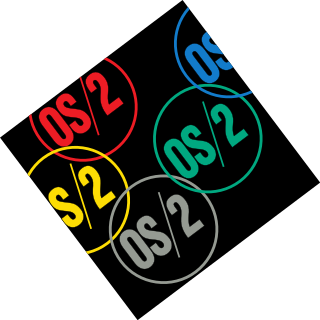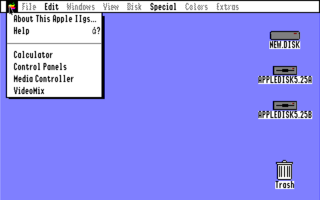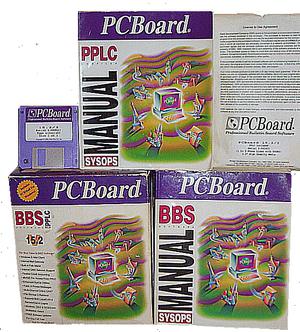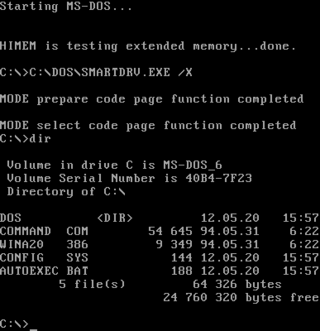Related Research Articles

A bulletin board system (BBS), also called a computer bulletin board service (CBBS), is a computer server running software that allows users to connect to the system using a terminal program. Once logged in, the user performs functions such as uploading and downloading software and data, reading news and bulletins, and exchanging messages with other users through public message boards and sometimes via direct chatting. In the early 1980s, message networks such as FidoNet were developed to provide services such as NetMail, which is similar to internet-based email.

Lynx is a customizable text-based web browser for use on cursor-addressable character cell terminals. As of 2024, it is the oldest web browser still being maintained, having started in 1992.

OS/2 is a proprietary computer operating system for x86 and PowerPC based personal computers. It was initially created and developed jointly by IBM and Microsoft, under the leadership of IBM software designer Ed Iacobucci, intended as a replacement for DOS. The first version was released in 1987; a feud between the two companies beginning in 1990 resulted in Microsoft leaving development exclusively to IBM, who continued development on their own. OS/2 Warp 4 in 1996 was the last major upgrade, after which IBM slowly halted the product as it failed to compete against Microsoft's Windows; updated versions of OS/2 were released by IBM until 2001.

GS/OS is an operating system developed by Apple Computer for its Apple IIGS personal computer. It provides facilities for accessing the file system, controlling input/output devices, loading and running program files, and a system allowing programs to handle interrupts and signals. It uses ProDOS as its primary filing system. GS/OS is a component of Apple IIGS System Software versions 4.0 through 6.0.1, and was the first true 16-bit operating system for the IIGS.
RAR is a proprietary archive file format that supports data compression, error correction and file spanning. It was developed in 1993 by Russian software engineer Eugene Roshal and the software is licensed by win.rar GmbH. The name RAR stands for Roshal Archive.
Synchronet is a multiplatform BBS software package, with current ports for Microsoft Windows, Linux, and BSD variants. Past versions also ran on MS-DOS and OS/2, but support for those platforms were dropped in version 3.0.

PCBoard (PCB) was a bulletin board system (BBS) application first introduced for DOS in 1983 by Clark Development Company. Clark Development was founded by Fred Clark. PCBoard was one of the first commercial BBS packages for DOS systems, and was considered one of the "high end" packages during the rapid expansion of BBS systems in the early 1990s. Like many BBS companies, the rise of the Internet starting around 1994 led to serious downturns in fortunes, and Clark Development went bankrupt in 1997. Most PCB sales were of two-line licenses; additional line licenses were also available.
Mystic BBS is a bulletin board system software program that began in 1995 and was first released to the public in December 1997 for MS-DOS. It has been ported to Microsoft Windows, OS/2, OS X, and Linux. Mystic was designed to be a spiritual successor to the Renegade (BBS) and Telegard bulletin board systems.

Maximus is a bulletin board system, originally developed by Scott J. Dudley through his company, Lanius Corporation. The software was first written and released for both MS-DOS and OS/2, with later versions supporting 32-bit Windows operating systems. The MS-DOS version interfaced with the serial port through a FOSSIL driver. Version 1.0 was released in 1990, with versions 2.0 and 3.01 following in 1991 and 1995. The source code for Maximus and its companion utilities, such as Squish, was released under the GNU General Public License in 2002. It has since been ported to run under Linux, and other Unix-like operating systems.

Watcom C/C++ is an integrated development environment (IDE) product from Watcom International Corporation for the C, C++, and Fortran programming languages. Watcom C/C++ was a commercial product until it was discontinued, then released under the Sybase Open Watcom Public License as Open Watcom C/C++. It features tools for developing and debugging code for DOS, OS/2, Windows, and Linux operating systems, which are based upon 16-bit x86, 32-bit IA-32, or 64-bit x86-64 compatible processors.
Take Command Console (TCC), formerly known as 4DOS for Windows NT (4NT), is a command-line interpreter by JP Software, designed as a substitute for the default command interpreter in Microsoft Windows, CMD.EXE.
Celerity BBS was a descendant of the freely distributed source of TCS BBS 1.43, and ultimately nearly completely rewritten.

RemoteAccess is a DOS Bulletin Board System (BBS) software package written by Andrew Milner and published by his company Wantree Development in Australia. RemoteAccess was written in Turbo Pascal with some Assembly Language routines. RemoteAccess began in 1989 as a clone of QuickBBS by Adam Hudson. It was released under the shareware concept in 1990 and became popular in North America, Europe, UK, South Africa, and the South Pacific. Initially the main advantage over QuickBBS was its ability to run multiple nodes under Microsoft Windows, Quarterdeck's DESQview and OS/2. RA could also operate over a network or even a combination of network and multitasking operating systems to provide multiple "nodes per station" capabilities.
FastEcho is a message processing package for FTN mail systems. It was written and released as shareware by Tobias Burchhardt in 1991. The final version was 1.46.1 which was released in 1997. FastEcho was one of the fastest FTN mail processing packages available for FTN style messages. Running on MS-DOS, DPMI and native OS/2 32-bit, it offered numerous features that were desirable for leafnode systems as well as highend FTN mail distribution hubs.

Moblin, short for 'mobile Linux', is a discontinued open source operating system and application stack for Mobile Internet Devices (MIDs), netbooks, nettops and embedded devices.
GT Power is a bulletin board system (BBS) and dial-up telecommunications/terminal application for MS-DOS. It was first introduced in the 1980s by P & M Software, founded by Paul Meiners. GT Power can be used both to host a BBS as well as to connect to other BBS systems via its full-featured dial-up "terminal mode". GT Power was a shareware package that required a registration fee in order to access its proprietary network mail transport/handling software and, by default, the GT Power Network. The software is distributed in two "flavors": a terminal-only version, nicknamed GTO, and the full-featured host and terminal version.
A web browser is a software application for retrieving, presenting and traversing information resources on the World Wide Web. It further provides for the capture or input of information which may be returned to the presenting system, then stored or processed as necessary. The method of accessing a particular page or content is achieved by entering its address, known as a Uniform Resource Identifier or URI. This may be a web page, image, video, or other piece of content. Hyperlinks present in resources enable users easily to navigate their browsers to related resources. A web browser can also be defined as an application software or program designed to enable users to access, retrieve and view documents and other resources on the Internet.
The Online Operating System was a fully multi-lingual and free to use web desktop written in JavaScript using Ajax. It was a Windows-based desktop environment with open-source applications and system utilities developed upon the reBOX web application framework by iCUBE Network Solutions, an Austrian company located in Vienna.

DOS is a family of disk-based operating systems for IBM PC compatible computers. The DOS family primarily consists of IBM PC DOS and a rebranded version, Microsoft's MS-DOS, both of which were introduced in 1981. Later compatible systems from other manufacturers include DR-DOS (1988), ROM-DOS (1989), PTS-DOS (1993), and FreeDOS (1998). MS-DOS dominated the IBM PC compatible market between 1981 and 1995.
FrontDoor was one of the most popular mailers in the FidoNet-compatible networks in the 1990s, acting as the physical representation of the written network node connection and mail handling standards. It was an MS-DOS-based product written by Joaquim Homrighausen. The FrontDoor system contained a Mailer, an Editor, a Terminal, a serial port device driver and configuration utilities. FrontDoor was first released in 1986.
References
- ↑ EzyCom News Archived 2012-07-29 at archive.today